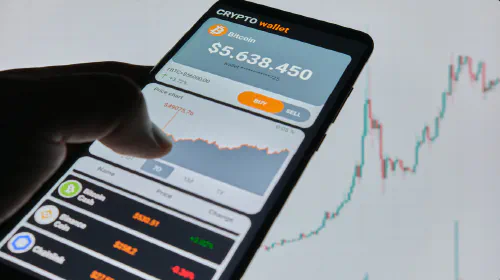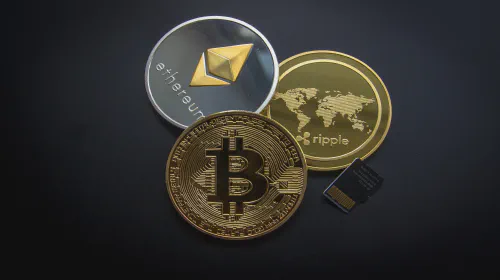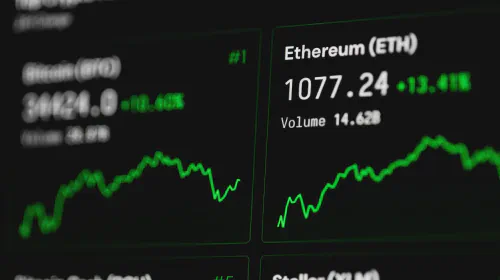What Does DeFi Really Mean?
Salomon Kisters
Jun 6, 2023This post may contain affiliate links. If you use these links to buy something we may earn a commission. Thanks!
Decentralized finance (DeFi) has gained significant traction in recent years and is now seen as a promising subset of the fintech industry. With an estimated smart contract value of over $83 billion by March 2022, DeFi has become a strong contender in the world of cryptocurrencies.
As a result, many entrepreneurs are looking to enter the DeFi space and capitalize on this growing trend. But what exactly is DeFi, and how does it work? These are important questions to consider before diving into this sector.
In this article, we’ll explain decentralized finance (DeFi) in great detail, explain how it works, compare it with centralized finance, and address the risks that come with it.
DeFi Explained
Decentralized finance (DeFi) is not just a buzzword but a fundamental shift in the way we think about finance. It is a financial system that runs on a decentralized network of computers rather than a single server.
DeFi is an emerging digital financial infrastructure that is built on the principles of transparency and trustworthiness. By eliminating the need for a central authority, DeFi allows for financial transactions to be conducted in a truly peer-to-peer manner.
Regarded by many as an umbrella term for a new wave of financial services innovation, DeFi has the potential to democratize finance, making it accessible to everyone. With DeFi, there is no need for intermediaries such as banks, which can reduce the transaction costs and time associated with traditional financial transactions and processes.
DeFi is deeply connected with blockchain technology, the decentralized, immutable, public ledger on which Bitcoin is based. This technology enables all computers or nodes on a network to hold a copy of the history of all transactions, making it virtually impossible to tamper with data.
The DeFi ecosystem is expanding rapidly, with new protocols and services being introduced almost every day. While DeFi is still in its early stages, it has the potential to revolutionize the global financial industry and bring financial sovereignty to people. The decentralized nature of DeFi makes it more transparent, secure, and resilient than traditional finance. As such, DeFi is poised to disrupt the financial industry and usher in a new era of financial freedom.
How does DeFi work?
DeFi basically takes out the intermediaries in financial transactions. This means that instead of relying on your bank or credit card company to facilitate your purchases, you can use digital currency and have complete control over it. Ethereum, the second most popular cryptocurrency after Bitcoin, is the main platform for DeFi.
The fundamental principles of DeFi are listed below:
- The absence of intermediaries implies zero involvement from banks or financial institutions in managing your funds.
- The code is available for anyone to review, ensuring stark transparency.
- Open networks are prevalent, transcending geographic limitations.
- Users have access to a wide range of applications, mainly built on Ethereum.
DeFi is a prominent player in the cryptocurrency industry, and is not just limited to creating digital currencies. Its purpose extends beyond that by using smart contracts to replace traditional financial systems. DeFi, thus, eliminates the entry barriers for various financial transactions, meaning that you no longer need a government or corporation to manage your money or qualify for specific financial products.
In contrast, traditional financial systems require you to apply for a loan and may deny you based on your credit score. You also need to have a bank account or investment brokerage with a company that oversees your funds.
DeFi’s smart contracts, in contrast, allow for specific financial transactions once particular conditions are met. Borrowing, lending, and other financial activities are possible with smart contracts, and the terms and conditions are written in the code.
These smart contracts and Ethereum’s application-building capabilities have enabled DeFi to be utilized in several ways:
- As a lending network that facilitates peer-to-peer borrowing and lending
- Through decentralized exchanges, enabling users to trade one type of cryptocurrency for another, such as Ether for US dollars
- For betting on the potential outcomes of events
- As stablecoins, which link cryptocurrencies to traditional fiat currencies like the US dollar, to lower price volatility and increase stability
Centralized Finance vs. Decentralized Finance (DeFi)
As already mentioned, decentralized finance (DeFi) is a relatively new concept that differs from the conventional financial institutions and banking that are centralized in nature.
Centralized Finance
In centralized finance, the transactions take place through intermediaries like banks and third-party service providers. These transactions are based on the involvement of institutions that transfer money, with each party charged a fee for using the intermediary’s services. Therefore, in centralized finance, the flow of money is controlled by a handful of large intermediaries who act as gatekeepers between the transacting parties.
For instance, when a credit card is charged at a store for the purchase of goods, the charge is initiated by the merchant and is forwarded to an acquiring bank. The acquiring bank then passes on the credit card details to the credit card network, which processes the charge and requests payment from the bank.
This chain of intermediaries involved in the transaction charges a fee for its services, which is generally paid by the merchant for using the credit and debit card services. Though centralized finance has its advantages, it also has drawbacks such as higher fees, limited access, and data privacy concerns.
Financial transactions are managed centrally, which includes everything from loan applications to the services offered by a local bank.
Decentralized Finance
Decentralized finance allows people, merchants, and businesses to conduct financial transactions without the need for intermediaries. This is made possible through the use of emerging technologies and peer-to-peer financial networks, which utilize security protocols, software, and hardware advancements to ensure speedy, secure, and efficient transactions.
With DeFi, individuals can lend, trade, and borrow from anywhere in the world, as long as there is an internet connection available. The use of distributed financial databases ensures that all financial actions are recorded and verified securely and transparently.
The decentralized nature of DeFi eliminates the need for a centralized finance model, providing users with more control over their money through personal wallets and trading services that cater to individual needs. Overall, DeFi represents a major shift towards a more democratic and accessible financial system for all.
Who is the Creator of DeFi?
The creation of decentralized finance was not the result of a single individual’s efforts. It was a collective effort from a community of tech enthusiasts who shared a vision of introducing a new financial order that is open, transparent, and accessible to everyone.
One of the most prominent figures in this regard is Satoshi Nakamoto, the creator of Bitcoin BTC and the underlying blockchain technology. The true identity of Satoshi Nakamoto remains unknown, which basically adds to the fascination and mysticism surrounding the development of Bitcoin and the subsequent growth of decentralized finance.
But that’s not all! The visionary programmer turned entrepreneur Vitalik Buterin, who developed Ethereum as an alternative to Bitcoin also played a significant role in the creation of DeFi. Vitalik’s 2013 white paper on Ethereum was a game-changer that enabled developers to create their own decentralized applications using a built-in programming language.
Over the past nine years, Ethereum has grown from strength to strength and has become the go-to platform for DeFi enthusiasts worldwide. Its popularity and adoption continue to grow as more and more developers leverage its power to create innovative financial products and services.
Despite the enigma surrounding the creator of DeFi, there is no denying the impact that the technology has had on the financial world.
The Risks Involved with DeFi
DeFi, being a new decentralized blockchain network, comes with its fair share of risks. As with any trading involving cryptocurrencies, investors need to be cautious and aware of the potential pitfalls that are associated with this technology.
For novices, the lure of potential gains through yield farming and passive income can be irresistible, but it’s important to remember that these opportunities come with significant risks. Ethereum, the most popular blockchain platform for DeFi, has implemented proper security and scam prevention guidelines, but it’s important to be aware of the broader potential risks associated with these protocols.
One of the most significant risks is the prevalence of fraud and crime within the DeFi ecosystem. According to data compiled by Chainalysis, a popular blockchain data platform, a staggering $14 billion was sent to illicit addresses in 2020. This highlights the need for caution and due diligence when investing in DeFi projects.
While the potential rewards are undoubtedly tempting, investors must exercise prudence and carefully evaluate the risks involved. Understanding the risks and taking appropriate measures to mitigate them is crucial for anyone looking to participate in the DeFi space.
Conclusion
DeFi, short for Decentralized Finance, has gained considerable popularity in the cryptocurrency world.
In essence, DeFi refers to a financial system that operates within blockchains and smart contracts, bypassing the traditional banking system.
This innovative technology allows users to access a range of financial services, from lending and borrowing to trading and investing, using cryptocurrency and smart contracts.
Stay informed with the latest insights in Crypto, Blockchain, and Cyber-Security! Subscribe to our newsletter now to receive exclusive updates, expert analyses, and current developments directly to your inbox. Don't miss the opportunity to expand your knowledge and stay up-to-date.
Love what you're reading? Subscribe for top stories in Crypto, Blockchain, and Cyber-Security. Stay informed with exclusive updates.
Please note that the Content may have been generated with the Help of AI. The editorial content of OriginStamp AG does not constitute a recommendation for investment or purchase advice. In principle, an investment can also lead to a total loss. Therefore, please seek advice before making an investment decision.

Top 6 Best DeFi Wallets
Learn about the top 6 DeFi wallets that provide a user-friendly interface and robust security measures. Find the perfect wallet for your cryptocurrency needs.

DeFi Tokens vs. Coins - What is the Difference?
DeFi is everywhere. But what are DeFi tokens, and how are they different from coins?

DeFi vs. Bitcoin: Exploring Key Differences and Unique Benefits
Understand the key differences between DeFi (decentralized finance) and Bitcoin, exploring their unique benefits and how blockchain technology enables financial freedom.
Protect your documents
Your gateway to unforgeable data. Imprint the authenticity of your information with our blockchain timestamp